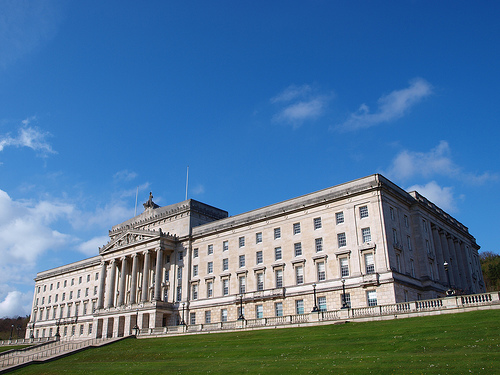
Stormont, Northern Ireland Assembly
Photo: Iker Merodio via Creative Commons ccbynd2.0
Anti-poverty goals climb the arts agenda
The culture ministries in Wales and Northern Ireland have set out plans to put social inclusion at the heart of their policy-making.
Northern Ireland’s Department of Culture, Arts and Leisure (DCAL) has revised the priorities for all its arms-length bodies to place promoting equality and tackling poverty and social exclusion at the top of the list.
The new public policy priorities are explicitly set out in DCAL's revised Mission Statement, which specifies “proactively targeting meaningful resources at sectors of greatest inequality, within areas of greatest objective need…”. The Department’s new Business Plan for 2013/14 states that the “aim of promoting equality and tackling poverty and social exclusion now drives the agenda, and hence the prioritisation of work, within the Department.”
In the foreword to the Plan, Carál Ní Chuilín, Minister of Culture, Arts & Leisure, said: “…the entire DCAL family must now ensure the transformation of our delivery models in order to swiftly deliver genuine and long-standing social and economic improvements across the North.” The Plan makes it clear that whilst promoting equality and tackling poverty and social exclusion have always been obligations for DCAL, they had previously been considered as “additional”.
This approach is set to change: “Previously the Department developed policy and delivered services in the culture, arts and leisure sectors and then considered how these could be tailored to promote equality and tackle poverty and social exclusion. Now the Department will consider what policy needs to be developed and what services need to be delivered in order to positively promote equality and tackle poverty and social exclusion.”
The changes in Northern Ireland coincide with an announcement in Wales by Minister for Culture and Sport John Griffiths, that he intends to strengthen the role that culture and heritage bodies play in tackling poverty.
He wants to see more people in the most disadvantaged areas of Wales given better access to the arts, culture and historic environment, and has asked the outgoing Chair of English Heritage, Baroness Kay Andrews OBE, to produce a report that will make recommendations on how the arts, heritage, museum, archive and library sectors can work better together to meet this aim.
The report will also recommend how these bodies can develop stronger links with anti-poverty schemes such as the Welsh Government’s Communities First programme.
Griffiths said: "Our Programme for Government outlines our commitment to increasing participation in culture and heritage . I want to give particular encouragement to low income families and children. It is important that we develop this agenda by ensuring that all the key organisations, as well as Government, work together as well as possible."
Join the Discussion
You must be logged in to post a comment.